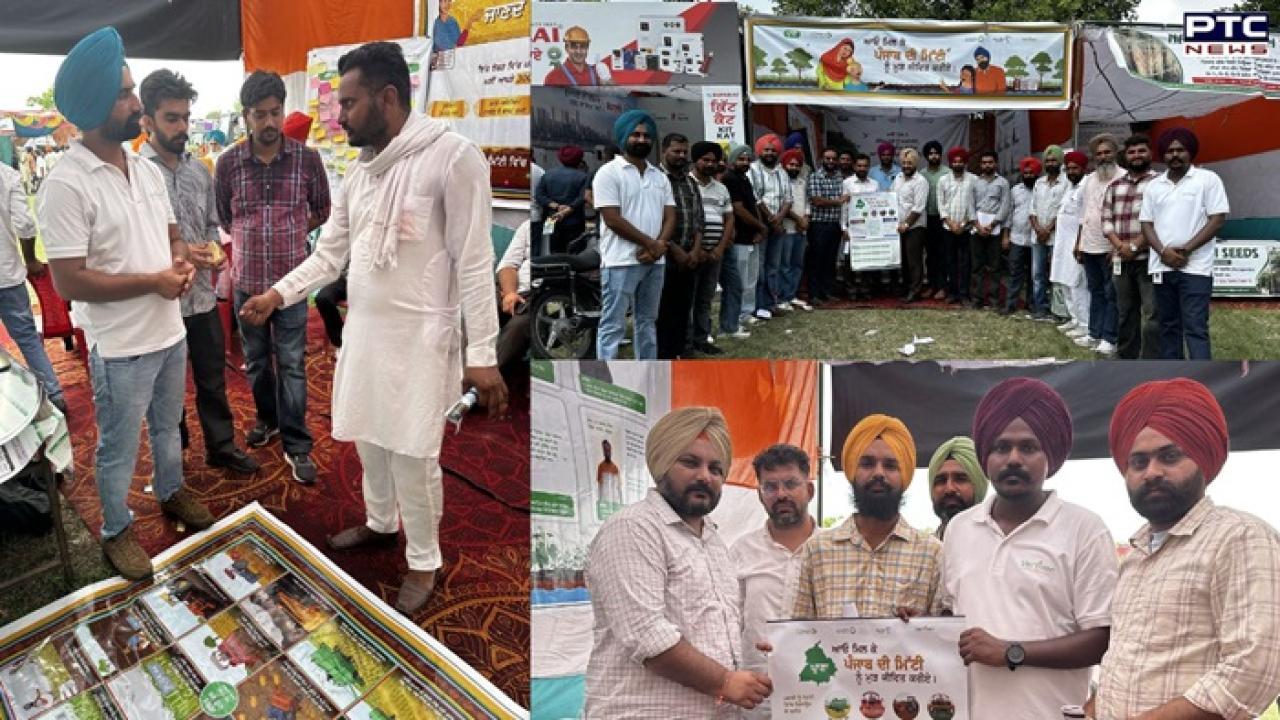

Farmers participate in Faridkot Kisan Mela; regenerative agriculture, crop residue management in focus
PTC News Desk: The Faridkot Kisan Mela, organised by Punjab Agricultural University (PAU), brought together hundreds of farmers, students, and agriculturists to promote new farming techniques and practices.
The PRANA (Promoting Regenerative and No Burn Agriculture) project, led by Nature Conservancy India Solutions Private Limited (NCIS), featured a stall focusing on regenerative agriculture and crop residue management (CRM). A team of around 20 trained agricultural experts from PRANA's partner organizations, Vertiver Private Limited and RGR Cell, actively engaged farmers through interactive exhibits at the stall.
The PRANA stall was a hub of activity, with engaging banners, murals, and an interactive gamification tool designed to educate and engage visitors. The stall emphasised the important role women can play in promoting regenerative practices. Exhibits featured powerful messages from women, highlighting their efforts to CRM and sustainable farming.
The stall promoted regenerative agriculture and CRM practices through engaging banners, murals, and an interactive gamification tool. A special banner highlighted champion farmers, showcasing their CRM practices and the duration of their adoption. The gender-inclusive exhibits encouraged participation from both male and female farmers.
Banners and murals also provided key insights into the nutrients in crop residue, emphasizing that one ton contains around 400 kg of organic carbon, along with nitrogen, phosphorus, and potassium, promoting the adoption of in situ CRM practices.
The stall's interactive elements included the “Aim and Throw” game, “Kheti de Sahi Dhang,” which allowed farmers to test their knowledge of CRM benefits. This game, along with other activities, aimed to enhance understanding of how CRM practices can boost soil fertility, conserve water, and improve overall health in Punjab.
Kulwinder Singh, a farmer from Faridkot, after engaging in the interactive game, said, “We truly appreciate how they explained the importance of soil nutrients. Through the game, we learned that Mitti (soil) is like gold—if we protect it, we can reduce half of our agricultural costs. The soil provides us with essential nutrients like potassium, and by preserving it, we not only avoid the harmful effects of smoke and pollution but also improve both our farming and our health.”
Chhaya Bhanti, CEO of Vertiver said, “Our behavioural research in various parts of Punjab has indicated that women are increasingly concerned about addressing water and health issues. By placing women’s role at the centre of our narratives and engagement, we are supporting the PRANA project in accelerating regenerative agriculture practices in Punjab, which can play a huge role in addressing these issues.”
Agricultural experts addressed farmers' concerns on regenerative agriculture and crop residue management at the stall and provided informative literature on water-saving methods and soil fertility-enhancing practices. Additionally, attendees at the stall were also quizzed on their knowledge of Crop Residue Management (CRM), water conservation, agriculture, and health. An Agri-calendar, specially developed by Vertiver’s agronomists and design specialists, to enable farmers to understand how Crop Residue Management benefits soil and water, was particularly well-received.
Malwinderpal Singh, a farmer from Matta village in Faridkot, expressed his appreciation after visiting the stall, stating, "The PRANA team is debunking myths about crop residue and raising awareness about the loss of organic carbon in the soil caused by crop burning. They're helping farmers understand the long-term harm and the benefits of sustainable practices."
The creative stall exhibits captivated visitors, who showed great enthusiasm and interest in learning more about sustainable agriculture practices. PRANA (Promoting Regenerative and No Burn Agriculture) project is working in 18 districts of Punjab to promote no-till and regenerative agriculture practices in addition to no-burn, improving soil structure and increasing soil carbon.
- PTC NEWS
